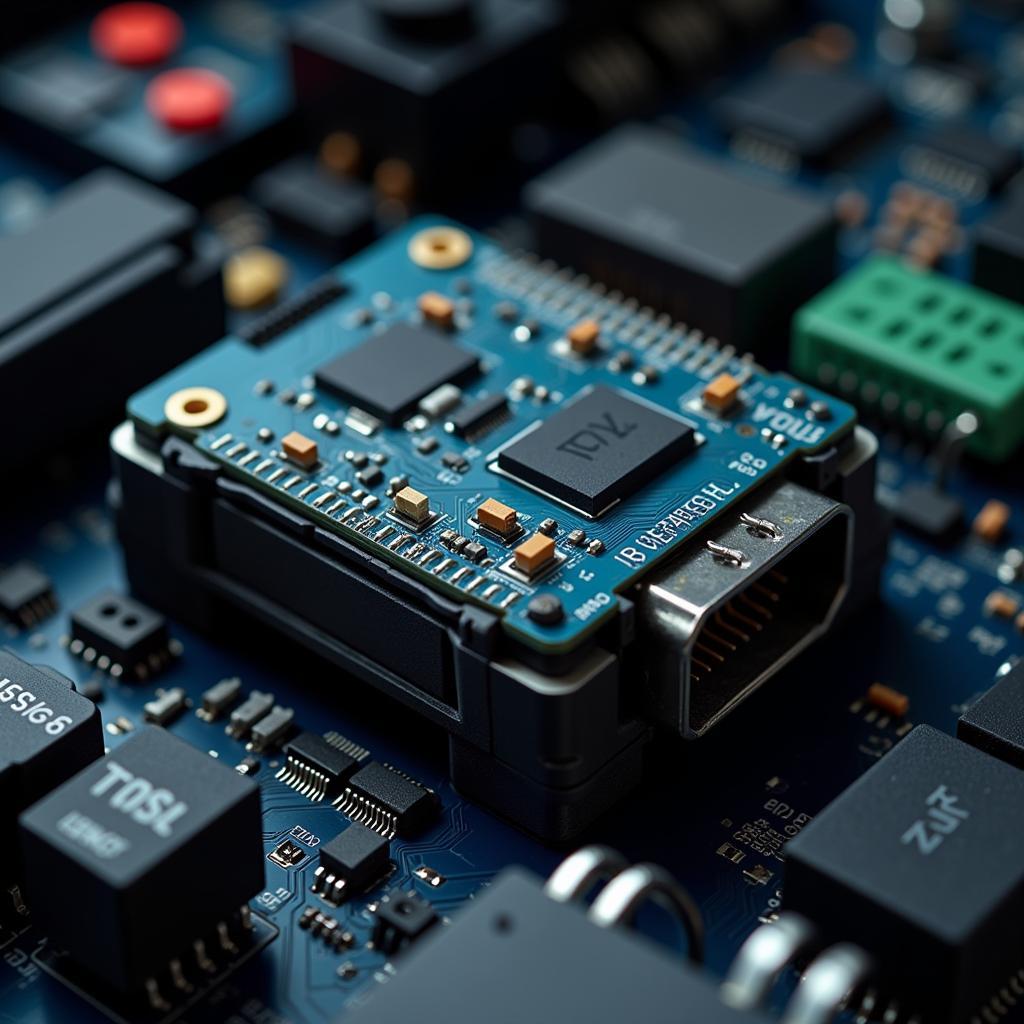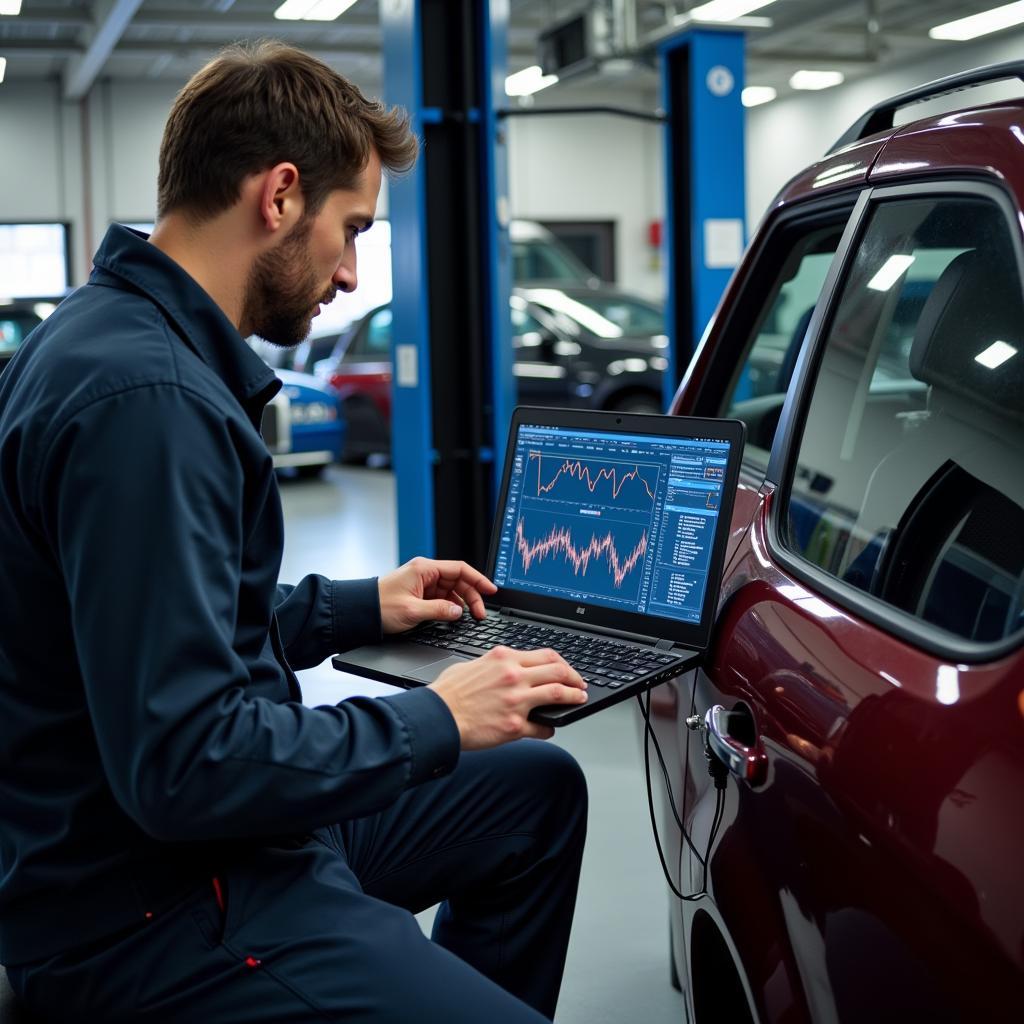The automotive industry is undergoing a technological renaissance, and at the heart of this revolution lies Electronic Diagnostic Equipment For Cars. These sophisticated tools have become indispensable for mechanics and car enthusiasts alike, offering a window into the increasingly complex world of modern vehicles.
The Rise of Automotive Technology and the Need for Advanced Diagnostics
Gone are the days of simple carburetors and mechanical systems. Today’s vehicles are powered by intricate electronic control units (ECUs) that manage everything from engine timing to brake systems. With this complexity comes the need for equally advanced diagnostic tools capable of understanding and interpreting the vast amounts of data generated by these systems.
 Car’s Electronic Control Unit
Car’s Electronic Control Unit
Understanding Electronic Diagnostic Equipment: More Than Just Code Readers
While basic code readers might have sufficed in the past, today’s electronic diagnostic equipment for cars encompasses a much broader spectrum of tools:
- OBD-II Scanners: These handheld devices connect to a car’s OBD-II port and retrieve diagnostic trouble codes (DTCs), providing insights into potential issues with various vehicle systems.
- Diagnostic Software Suites: Professional-grade software, often paired with dedicated hardware interfaces, offers comprehensive functionalities such as live data streaming, actuator tests, and advanced coding options.
- Oscilloscope and Multimeters: These tools allow technicians to analyze electrical signals and circuits in detail, identifying complex problems that code readers might miss.
 Mechanic Using Advanced Diagnostic Software
Mechanic Using Advanced Diagnostic Software
Benefits of Using Electronic Diagnostic Equipment
Investing in quality electronic diagnostic equipment for cars offers numerous benefits:
- Accurate and Efficient Diagnosis: Identifying the root cause of a problem quickly and accurately, reducing diagnostic time and improving repair efficiency.
- Comprehensive System Analysis: Accessing data from various ECUs provides a holistic view of the vehicle’s health, enabling proactive maintenance and preventing potential problems.
- Cost Savings for Car Owners: Accurate diagnostics lead to targeted repairs, minimizing unnecessary part replacements and labor costs.
Choosing the Right Electronic Diagnostic Equipment: Factors to Consider
Selecting the right diagnostic car device depends on your specific needs and expertise:
- DIY vs. Professional Use: DIYers might find basic OBD-II scanners sufficient, while professionals require more advanced tools and software suites.
- Vehicle Compatibility: Ensure the equipment supports the makes and models you work with, especially for older vehicles.
- Software Updates and Support: Regular software updates are crucial for compatibility with the latest vehicle models and technologies.
The Future of Car Diagnostics: Embracing Innovation
The evolution of electronic diagnostic equipment for cars shows no signs of slowing down. Emerging technologies such as:
- Cloud-based Diagnostics: Enabling remote diagnostics, data sharing, and collaborative troubleshooting.
- Artificial Intelligence (AI): AI-powered diagnostic systems can analyze vast amounts of data to identify patterns and predict potential failures.
 Cloud-based Car Diagnostics
Cloud-based Car Diagnostics
Conclusion: Staying Ahead of the Curve in Car Diagnostics
As automotive technology continues to evolve at a rapid pace, the importance of reliable and advanced electronic diagnostic equipment for cars cannot be overstated. Whether you’re a seasoned mechanic or a car enthusiast, investing in the right diagnostic tools empowers you to keep pace with this ever-changing landscape. By understanding the capabilities of these tools and choosing equipment suited to your needs, you unlock a world of possibilities for efficient car maintenance and repair.
FAQs about Electronic Diagnostic Equipment for Cars
Q: Can I use any OBD-II scanner on my car?
A: While most modern cars use the OBD-II standard, compatibility can vary. It’s crucial to choose a scanner that supports your car’s make, model, and year.
Q: What is the difference between a code reader and a scan tool?
A: Code readers primarily retrieve and display DTCs, while scan tools offer additional functionalities like live data streaming, actuator tests, and coding options.
Q: How often should I use my car diagnostic equipment?
A: It’s recommended to perform a diagnostic scan at least annually or whenever your car experiences unusual symptoms.
Q: Is it worth investing in professional-grade diagnostic equipment for personal use?
A: While expensive, professional equipment offers advanced features and comprehensive diagnostics. However, it might be overkill for basic DIY maintenance.
Need Help Choosing the Right Diagnostic Equipment?
For personalized advice and assistance in selecting the best electronic diagnostic equipment for cars, our team of experts is here to help. Contact us via WhatsApp: +1(641)206-8880, or email: [email protected]. We offer 24/7 customer support to address all your diagnostic needs.

Leave a Reply